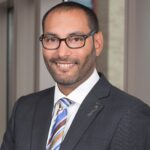Careful Patient Follow-Ups
On the other side of the continent, clinical pharmacist Janet Cho, PharmD, typically spends mornings at the Keck Medical Center of the University of Southern California (USC) rheumatology clinic in Los Angeles and afternoons at the Keck Medicine of USC Specialty Pharmacy, which only serves providers in the system.
Her roles and responsibilities include comprehensive medication management; drug safety monitoring; consultations for high-risk medications, such as biologics; prior authorizations; drug transfers between pharmacies; and coverage appeals management. “I want to highlight that patient education is probably the core of what I do. I spend a large portion of my time educating my patients, whether face to face in the clinic or on the telephone,” said Dr. Cho.
Workflow in the rheumatology clinic may begin with a pharmacy consult for a patient’s new therapy. “I always do a screening, making sure the drug is safe for the patient, with no comorbidities or labs that we’d be concerned about. We do all education, which can vary per patient depending on their receptiveness to or hesitation about the therapy. This can take from 10 to 45 minutes or an hour, so I do think that’s a lot of time saved for the team,” Dr. Cho stated. She also trains patients to inject their medications at home.
At the specialty pharmacy, Dr. Cho and her team manage prior authorizations and appeals, document insurance information and ensure that “baseline labs are completed before dispensing the medication. And then when the patient obtains the medication, that’s our favorite part of the process. At that point, we do our call. Initial consultations can last up to an hour, depending on the patient, especially if they have a lot of questions. And periodically, we follow up with them with one call after they start therapy, just to see if they tolerate their medication and to monitor for side effects or injection site reactions,” Dr. Cho explained.
The pharmacy team documents all medication-related notes in EMRs. “We don’t need to ask the care team for any additional information, because we have access to what we need.” Pharmacists have been able to reduce the heavy workload of the clinic’s nurses, she said.
Dr. Cho tracked prior authorization data at her center from July 2017 to September 2018 and found that for rheumatology and gastroenterology autoimmune patients, the clinic posted an 84.6% approval rate, and 21 out of 31 prescription coverage denials were overturned on appeal. The center also exceeded a Medicare standard measure for proportion of days covered by prescription claims for a medication, indicating high levels of patient adherence to therapy.
In another report tracking medication-related problems (MRPs) from August 2017 to August 2018, Dr. Cho found her clinic had 184 total rheumatology-related MRPs, including 110 for specialty pharmacy prescriptions. Safety issues were the most common MRPs, including laboratory or diagnostic tests indicated but not ordered, improper storage of the drug by the patient, and medication overuse or misuse.
The pharmacy staff’s goals include ensuring they address all MRPs among the clinic’s patients and improve patient education and training, said Dr. Cho.


